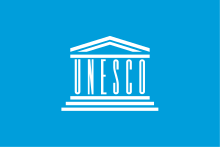
UNESCO
Specialised agency of the United Nations for education, sciences, and culture / From Wikipedia, the free encyclopedia
Dear Wikiwand AI, let's keep it short by simply answering these key questions:
Can you list the top facts and stats about UNESCO?
Summarize this article for a 10 years old
The United Nations Educational, Scientific and Cultural Organization (UNESCO)[lower-alpha 1] is a specialized agency of the United Nations (UN) aimed at promoting world peace and security through international cooperation in education, arts, sciences and culture.[2][3] It has 194 member states and 12 associate members,[4] as well as partners in the non-governmental, intergovernmental and private sector.[5] Headquartered in Paris, France, UNESCO has 53 regional field offices[6] and 199 national commissions[7] that facilitate its global mandate.[8]
 | |
| Abbreviation | UNESCO |
|---|---|
| Formation | 16 November 1945; 77 years ago (1945-11-16) |
| Type | United Nations specialised agency |
| Legal status | Active |
| Headquarters | Paris, France |
Head | Audrey Azoulay (Director-General) |
Parent organization | United Nations Economic and Social Council |
| Website | unesco.org |
UNESCO was founded in 1945 as the successor to the League of Nations' International Committee on Intellectual Cooperation.[9] Its constitution establishes the agency's goals, governing structure, and operating framework.[10] UNESCO's founding mission, which was shaped by the World War II, is to advance peace, sustainable development and human rights by facilitating collaboration and dialogue among nations.[10] It pursues this objective through five major programme areas: education, natural sciences, social/human sciences, culture and communication/information. UNESCO sponsors projects that improve literacy, provide technical training and education, advance science, protect independent media and press freedom, preserve regional and cultural history, and promote cultural diversity.[11][12][13]
As a focal point for world culture and science, UNESCO's activities have broadened over the years; it assists in the translation and dissemination of world literature, helps establish and secure World Heritage Sites of cultural and natural importance, works to bridge the worldwide digital divide, and creates inclusive knowledge societies through information and communication.[14] UNESCO has launched several initiatives and global movements, such as Education For All, to further advance its core objectives.
UNESCO is governed by the General Conference composed of member states and associate members, which meets biannually to set the agency's programs and budget. It also elects members of the executive board, which manages UNESCO's work, and appoints every four years a Director-General, who serves as UNESCO's chief administrator. UNESCO is a member of the United Nations Sustainable Development Group,[15] a coalition of UN agencies and organisations aimed at fulfilling the Sustainable Development Goals.